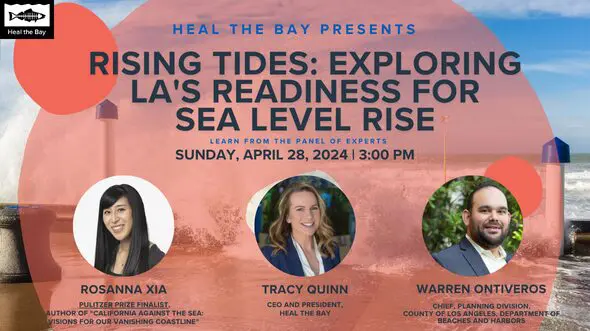Black Surfing Assn. Spreads the Stoke
Long Beach / AvalonMalibu / Pacific PalisadesMarina del Rey / Playa del ReyPalos Verdes PeninsulaSanta MonicaSouth BayVenice Beach
Today’s blogger is Matthew King, Heal the Bay’s communications director.
Surfing is not kind to beginners. The waves are intimidating, the equipment expensive and the “rules” of the sport confusing. Learning how to get upright on a board is a grueling test of stamina, patience and ego. While seasoned surfers pop up gracefully around them, newbies flail helplessly at passing waves or get buried underneath tons of churning whitewash. Novices also end up eating a lot saltwater and hearing abuse if they get in the way of seasoned surfers.
But
if they put in enough hours, by some stroke of luck or divine grace, newcomers
will eventually latch onto their first feathering wave. Gliding
toward shore, they’ll feel the ocean’s power rumbling beneath their feet.
They’ll also feel an amazing calm in their soul. It’s called “stoke.”
And it’s why surfers spend hours dreaming about the shifting ocean.
But surfing has traditionally been a clannish, secret society. For outsiders looking in, learning its mysterious arts presents many challenges. There is no AYSO of surfing, so historically the sport has been handed down informally by fathers (and some mothers) who grew up along Southern California’s coastal strip. As a result, many athletes in inland neighborhoods have been marginalized from the experience and not given the opportunity to learn to surf. It’s been a particular challenge for people of color in underserved communities, many of whom lack the resources, access and tradition to chase waves.
But there is a thriving band of African-American surfers in Southern California who are committed to exposing ocean culture to their communities and beyond. The mission of the Black Surfing Association (BSA) dovetails nicely with our work at Heal the Bay, so I jumped at the chance to attend one of the group’s recent mixers in Baldwin Hills, arranged by the amiable Rick Blocker.
Surfers being surfers, our group of nearly 50 spent more time talking about our favorite local breaks than organizational politics. The group is composed of enthusiastic people from all walks of life: firefighters, teachers, artists and DJs. A highlight was a brief talk given by Bruce Wigo, the chairman and CEO of the International Swimming Hall of Fame, who explained how American blacks have been cut off from their rich African history of swimming mastery, such as pearl diving off the Horn of Africa. He made a stirring plea about the need to create programs that will keep young African Americans safe by teaching them how to swim.
To help further those goals and to spread the stoke, the BSA is sponsoring a series of Pan African Beach Days this summer at Dockweiler Beach. Club members will be providing free surfing lessons and supplying equipment. You couldn’t ask for a more friendly introduction to the sport. The get-togethers begin at noon on the first Sunday of every month, starting June 3 and running through Oct. 7. Participants will gather at Lifeguard Tower 49 and celebrate surf culture in all its forms: beaching, surfing, bicycling, skateboarding, fishing, volleyball, capoeira and fireside cooking.
For more information, contact Dedon Kamathi, BSA President-SoCal Chapter at (323) 646-4814.



